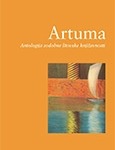22. 5. 2008
The third volume of the Vilenica Anthologies series, edited by Jana Unuk and focused on less familiar European literatures, bears the title Artuma (‘closeness’ in Lithuanian) and is dedicated to contemporary Lithuanian literature. The anthology, compiled and edited by Bernarda Pavlovec ??umer, presents eighteen authors: Antanas Škėma, Vytautas P. Bložė, Tomas Venclova, Alfonsas Andriuškevičius, Sigitas Geda, Ričardas Gavelis, Nijolė Miliauskaitė, Juozas Šikšnelis, Kornelijus Platelis, Antanas A. Jonynas, Birutė Jonuškaitė, Eugenijus Ališanka, Jurga Ivanauskaitė, Sigitas Parulskis, Herkus Kunčius, Alvydas Šlepikas, Sonata Paliulytë, and Marius Ivaškevičius. The Slovene translations have been provided by Bernarda Pavlovec ??umer and Lucija Štamulak, with Ona A. Čepaitytė Gams as the language consultant. The author of the accompanying study, which traces the development of Lithuanian literature from the first book in 1547 until now, is Kornelijus Platelis – poet, translator, essayist, and consultant to the Vilenica jury. The visual design of the book, which was published with the support of the following institutions: Books from Lithuania, Literature Across Frontiers, and the Embassy of Lithuania in Ljubljana, matches the overall design of the series, the cover featuring a picture by Mikalojus Konstantinas Čiurlionis, a recognised Lithuanian artist.From the foreword of the editor, Bernarda Pavlovec ??umer:
“A look at Lithuanian literary history and a comparison with its Slovene counterpart reveals unexpected parallels with this geographically remote northern nation. Like ours, their literary development begins with Protestantism, with the catechism and alphabet book; literary periods reach both of us with a delay; literature, especially patriotic, preserves and encourages the readers’ national consciousness and is deeply rooted among the people. In addition, lively literary activity takes place abroad among emigrants. Like the Slovenes, the Lithuanians are considered a nation of poets, and they like to parade before strangers the saying that each pencil in Lithuania has its poet /…/. The selection seeks to introduce both contemporary Lithuanian literature and Lithuania itself, to bring to the reader a piece of this country, of the Lithuanian national mentality.”
 Literature. The book will be presented with a number of guest authors at the Vilenica festival.
Literature. The book will be presented with a number of guest authors at the Vilenica festival.
